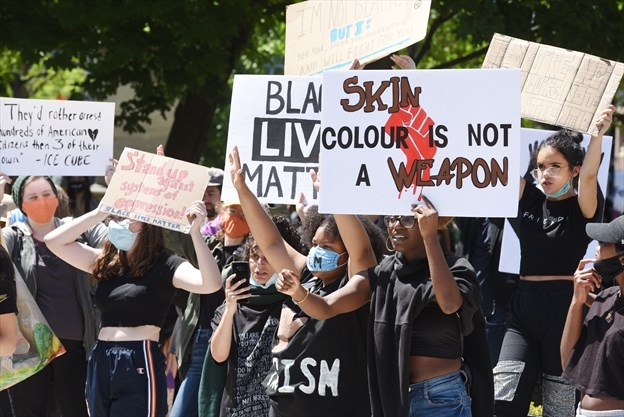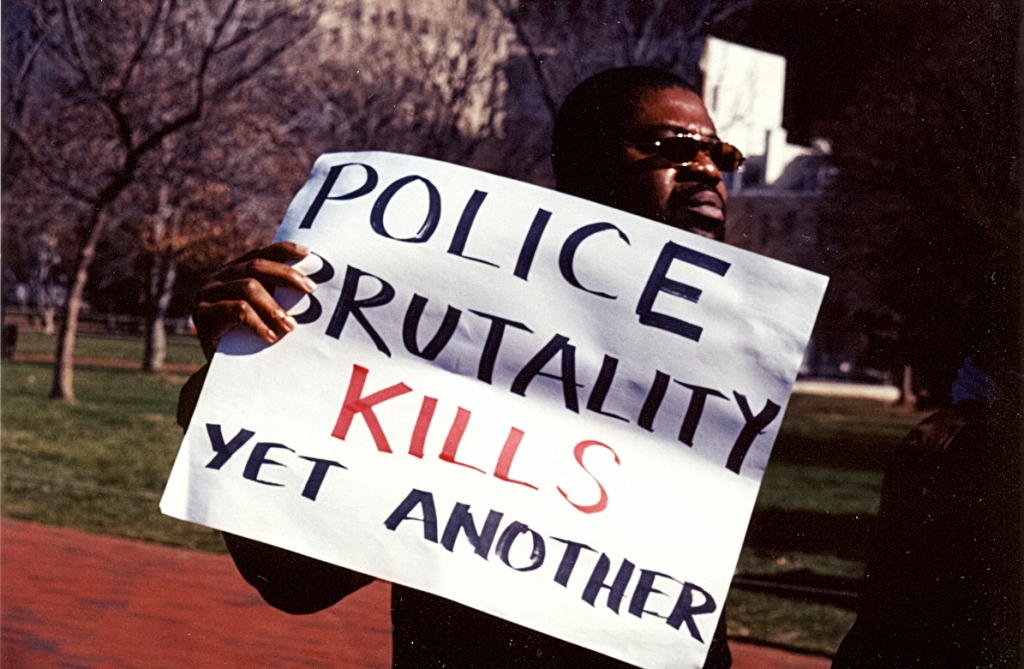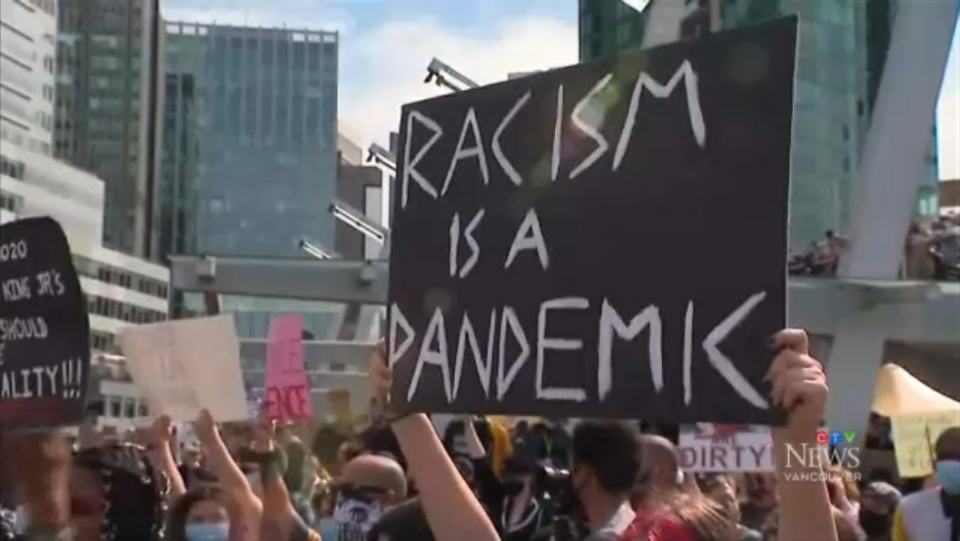
I don’t have a TV and with working from home I haven’t been hearing as much news as before, but even so I know of the riots and protests and yet another murder of a person of color, of George Floyd. It makes me angry. I want to cry and it feels like nothing has changed since slavery was abolished. That’s partly hyperbole because things have changed, but the continual abuse of people of color, the fear under which they live and the treatment of them all as guilty first has not changed. The license to be more racist has certainly been given under the auspices of the racist, bigoted, misogynistic sociopath who is supposed to be leader of the US. But it certainly didn’t start with him and he’s a sign of an ongoing disease.
I live in Vancouver, BC. Canada is known for being polite, being a little more placid than some countries. Port cities throughout the centuries have always been more tolerant due to the many cultures that would flow in and out of the seaports. Though Vancouver is a port city, that does not mean we are free of racism. We have significant numbers of people of Chinese, Indian and Indigenous descent. There are other Asian races as well and black people though their numbers are higher in central and eastern Canada. However, we are naive if we think we don’t have racists and bigots living amongst us. There is still a percentage of people who think their whiteness makes them better than others. What we are though, is more privileged than many people of color.
Last night, in my quiet East Van hood I went down to a local bar for a drink. We’re still spaced for social distancing purposes but around the corner from where I sat at the bar was a woman of color. We got talking about COVID, as one does these days, and then moved off to other discussions of language and culture and countries. She’s a brown woman, born and bred in East Van but her cultural background is from India and Fiji and she identified herself as a brown dyke living in East Van.
I asked her if she’s ever experienced racism or police stereotyping and her answer was, hell yeah. She was taught that the moment you hear the whoop whoop of a police car, you put your hands above your head. She’s been stopped three times by police when she was going home from work. She’s been questioned and searched. She carries a pocket knife, partly because she works in a hardware store and uses it on the job, but it’s not illegal to carry a knife. She’s missed taking her bus home as she sat at a bus stop because police were asking her what she was doing and where she was coming from, and all because her skin is brown.

I kept hearing about white privilege and didn’t feel that privileged. I’m not rich or elite or superior, but what I have that people of color don’t is that I have never had to worry about being shot, or beaten or questioned because of my skin color. I haven’t had to fear a police car. My parents did not have to teach me to live in caution and fear of the police, those who are supposed to protect all citizens equally. Sure, as a woman, I have to face other fears; that a man might overpower or rape me and I have experienced sexual abuse in the past. But I have not had to face this as a woman of color.
I’ve listened to news interviews and reports of people in other parts of the country and their experiences. In Toronto where there is a larger black population; CBC interviewed people about their experiences and they all had known someone who was shot or killed by police. I told this woman that I almost wanted to be with her to film these intrusions she’s had, but just by being there and being white, I would legitimize her, probably stopping the police from questioning her, which is a terrible thing to have–that a person is not seen a legitimate unless someone else of another class vouches for them. Sounds a lot like slavery, doesn’t it?
I’ve heard the stories where police would drive Indigenous kids to the edge of town in winter and make them walk home, sometimes with inadequate clothing as well. Some of those kids never made it. I’ve heard of Asians in Vancouver being verbally and physically attacked because of COVID 19. It’s here and it’s now.
Not all of this racism is perpetrated by police and not all police are terrible. In fact, I’m sure the majority in most places are good and upstanding people. But when you have a gas leak, it affects everyone in the area. And if you let racism leak in or flood those who are supposed to be upholders of justice and the law, then everything is tainted. People fear those who should be protecting them and there are far too many cases of people in police custody who have died from mysterious or downright blatant cases of violence. Justice stands for “just behavior and treatment.” To be just is to be fair and not be biased in any way.

I don’t believe in painting any one group with the same brush, and that goes for cultures, races, religions or even police. But as long as this blatant racial stigmatizing goes on, it will affect trust and incite anger. I worry about my friends who are not white, and what I don’t even know they have to face. I’ve lived in a protective bubble that I didn’t even know I had. My bubble shouldn’t have to pop but it should be so large that we’re all inside it being treated equal.
When those who have the power to uphold the law are the worst abusers of that law we will erode into a police state, where everyone lives in fear. Right now, for a significant portion of North America’s population, it is already a police state. Black lives matter: stop treating them like fodder.

 Today’s guest in Sara Tantlinger, another pretty amazing poet.
Today’s guest in Sara Tantlinger, another pretty amazing poet. And then my collection The Devil’s Dreamland, which won the 2018 Bram Stoker Award, was inspired by the life and lies of serial killer H.H. Holmes. The poems dip into his point of view pretty heavily, but I also included poems from the perspective of his victims, the city, and his murder castle in 1800s Chicago.
And then my collection The Devil’s Dreamland, which won the 2018 Bram Stoker Award, was inspired by the life and lies of serial killer H.H. Holmes. The poems dip into his point of view pretty heavily, but I also included poems from the perspective of his victims, the city, and his murder castle in 1800s Chicago. Poetry Inspired by H.H. Holmes. She is a poetry editor for the Oddville Press, a graduate of Seton Hill’s MFA program, a member of the SFPA, and an active member of the HWA. Her other books include Love for Slaughter and To Be Devoured. Her poetry, flash fiction, and short stories can be found in several magazines and anthologies, including The Twisted Book of Shadows, Sunlight Press, Unnerving, and Abyss & Apex. She embraces all things strange and can be found lurking in graveyards or on Twitter @SaraJane524 and at
Poetry Inspired by H.H. Holmes. She is a poetry editor for the Oddville Press, a graduate of Seton Hill’s MFA program, a member of the SFPA, and an active member of the HWA. Her other books include Love for Slaughter and To Be Devoured. Her poetry, flash fiction, and short stories can be found in several magazines and anthologies, including The Twisted Book of Shadows, Sunlight Press, Unnerving, and Abyss & Apex. She embraces all things strange and can be found lurking in graveyards or on Twitter @SaraJane524 and at  Every new mystery author dreams of landing a series. Many of us have several novels in mind with our lead character before the first one is finished. Yet how many of us recognize the many pitfalls to writing a series, in which every entry must be strong enough to both build our brand and pull our earliest readers forward?
Every new mystery author dreams of landing a series. Many of us have several novels in mind with our lead character before the first one is finished. Yet how many of us recognize the many pitfalls to writing a series, in which every entry must be strong enough to both build our brand and pull our earliest readers forward?


 Mine was about ten teenagers who went on a camping trip in a remote field and unearthed an ancient evil that possessed some of them, who then went around murdering the others. I really enjoyed writing it, and the teacher seemed to like it as well (she gave me an A+). It was something of a flawed story, but I was only 13 and had a lot to learn about the craft of writing.
Mine was about ten teenagers who went on a camping trip in a remote field and unearthed an ancient evil that possessed some of them, who then went around murdering the others. I really enjoyed writing it, and the teacher seemed to like it as well (she gave me an A+). It was something of a flawed story, but I was only 13 and had a lot to learn about the craft of writing. rain that makes them want to kill people? Or is it that such people are truly born evil?
rain that makes them want to kill people? Or is it that such people are truly born evil? Sometimes it puts your own problems into perspective. If you are reading a story about a world where a plague has wiped out all of humanity, and the few survivors face a daily battle of survival against brain-eating zombies, your own everyday worries seem somewhat insignificant in comparison.
Sometimes it puts your own problems into perspective. If you are reading a story about a world where a plague has wiped out all of humanity, and the few survivors face a daily battle of survival against brain-eating zombies, your own everyday worries seem somewhat insignificant in comparison. Sara Jayne Townsend is a UK-based writer, and someone tends to die a horrible death in all of her stories. She lives in Surrey with two cats and her guitarist husband Chris. She is author of several horror novels, the latest one being Outpost H311, the story of an oil exploration team who crashland on a remote island in the arctic to discover a hidden base that is hiding some sinister secrets.
Sara Jayne Townsend is a UK-based writer, and someone tends to die a horrible death in all of her stories. She lives in Surrey with two cats and her guitarist husband Chris. She is author of several horror novels, the latest one being Outpost H311, the story of an oil exploration team who crashland on a remote island in the arctic to discover a hidden base that is hiding some sinister secrets.

 Maybe we’ve been calling it “journalism” all along.
Maybe we’ve been calling it “journalism” all along.









